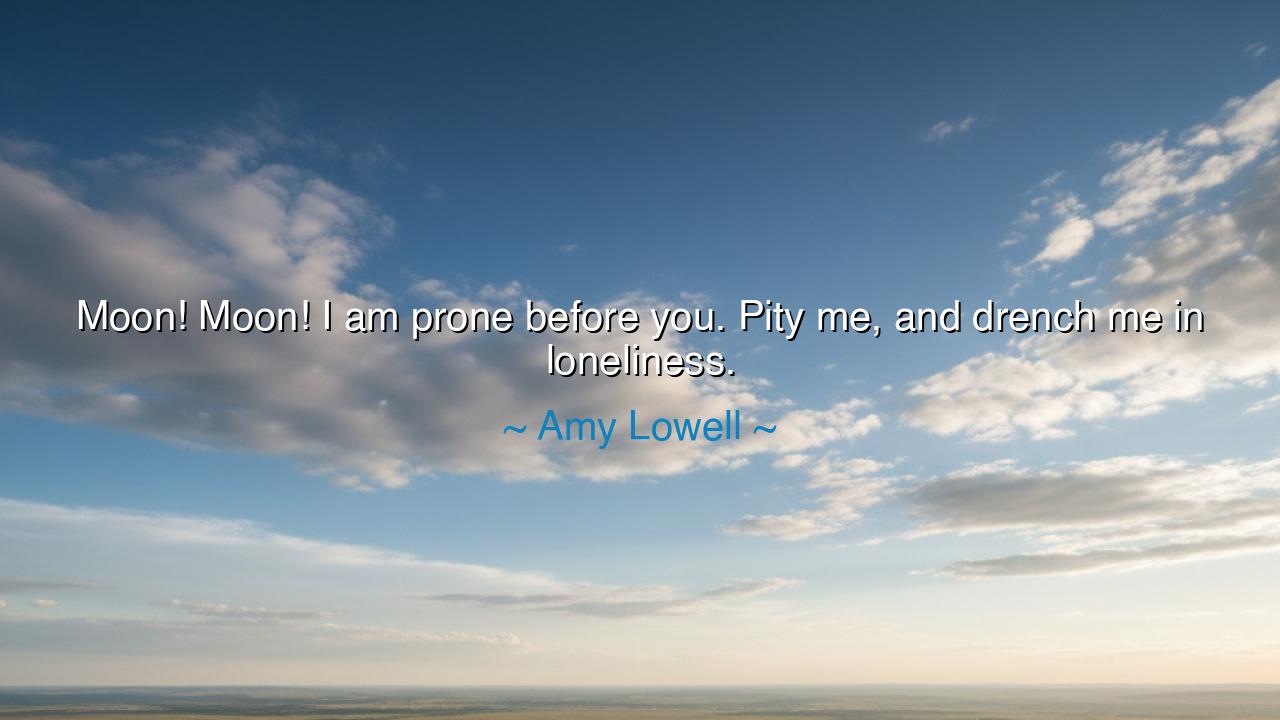
Moon! Moon! I am prone before you. Pity me, and drench me in






"Moon! Moon! I am prone before you. Pity me, and drench me in loneliness." With these words, Amy Lowell evokes a profound cry of desolation, an expression of the soul's deepest yearning for solace and understanding. In this prayer-like appeal to the moon, we witness a moment of vulnerability and surrender, as the speaker, humble and desperate, seeks not only sympathy but a kind of communion with the natural world. The moon, often a symbol of solitude, mystery, and feminine power, becomes the silent witness to the speaker's inner turmoil. In the stillness of night, beneath the cold, distant light of the moon, the speaker is drenched in a feeling of isolation so deep that they are compelled to ask for mercy from the heavens themselves.
Throughout the ages, the moon has been a symbol of loneliness and reflection, of the quiet solitude that resides in the human soul. In ancient mythology, the moon was often personified as a goddess—Selene, Artemis, or Chandra—who traversed the night sky, alone in her eternal journey. Yet even these celestial beings, despite their divine nature, were frequently depicted as solitary figures. The moon is often seen as an ethereal being that exists beyond the reach of others, a silent traveler, much like the individual who seeks understanding in their own isolation. The ancients knew that the night, under the glow of the moon, was a time when loneliness could be both a curse and a companion.
Consider the great poets and thinkers who, in their most reflective moments, turned to the moon for solace. Rainer Maria Rilke, in his “Letters to a Young Poet,” speaks of the quiet solitude that often accompanies the creative soul. The moon, for him, was a symbol of both distance and intimacy—its light shining over the vast, quiet earth, a reminder of both the human condition and its yearning for connection. Rilke, like Lowell, understood the moon’s unique position as both a distant observer and a silent companion to the lonely heart. To turn one's gaze to the moon is, in a way, to confront one's own solitude, to recognize the vastness of the universe and the smallness of the individual, and yet, in that recognition, to find a shared understanding with the cosmos.
The moon’s ability to evoke such feelings of loneliness is not simply due to its light but its mystery. It is a symbol of what is distant and unattainable, and yet, its light touches us all, as if inviting us to contemplate our own place in the universe. This is echoed in the stories of the great thinkers who, like Vincent van Gogh, found peace and purpose in their isolation. Van Gogh, whose life was marked by emotional suffering and solitude, found solace in the night sky, often painting the moon and stars as a way of reconciling his own inner chaos with the stillness of the universe. For him, the night sky, like the moon, became a place to pour out his own sorrow, to be alone, yet not entirely without connection.
Amy Lowell’s words are a call to acknowledge the truth of human loneliness—the moments when one stands before the vastness of existence, feeling utterly small and disconnected. But in that loneliness, there is also a great beauty. Just as the moon's light does not speak but casts a quiet glow over the world, so too does solitude offer us the opportunity for profound introspection. Loneliness, when faced with grace, can become a space for growth, a time to explore the depths of the soul, to understand one's own desires, fears, and dreams. It is in the silence of isolation that one might come closest to truth.
The lesson within Lowell's quote, then, is not one of despair but of recognition. Recognize that in moments of loneliness, we are not truly alone. The moon, as a constant companion in the night sky, reminds us that even in our darkest hours, there is something greater than ourselves that observes, understands, and bears witness to our plight. In this way, loneliness can become a source of strength rather than weakness. By embracing these moments of solitude, we learn to confront the innermost parts of ourselves, to grow in understanding, and to find peace in the stillness.
Practical actions for embracing loneliness as a path to growth: when you find yourself in moments of solitude, allow yourself to sit in stillness, much as the moon sits in the night sky, casting its light upon the world without judgment. Let your loneliness be a time of reflection, of asking the deeper questions about who you are and where you are going. Like the moon, remain constant in your journey, knowing that even in your isolation, you are connected to something much greater than yourself. Find comfort not in the absence of others, but in the understanding that, in this moment, you are exactly where you need to be.






AAdministratorAdministrator
Welcome, honored guests. Please leave a comment, we will respond soon